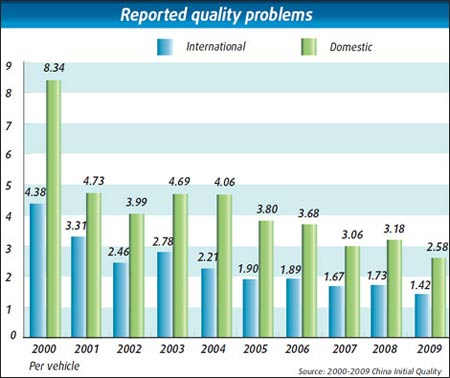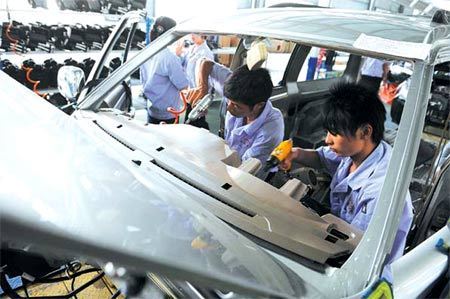Top Biz News
China's automakers dramatically improve quality
By Timothy Dunne (China Daily)
Updated: 2009-12-28 08:07
 |
Large Medium Small |

Based on consumer feedback, we found that owners of Chinese domestic vehicles experienced an average of 8.43 quality problems per vehicle. This number was, to put it politely, a bit disconcerting.
By comparison, owners of internationally branded vehicles built in China reported only 4.38 problems per vehicle, or almost 50 percent fewer problems on average.
|
|
|
Analyst: Quality should be top priority for China's automakers. [China Daily] |
Not only were the quality problems with Chinese domestic vehicles numerous, but the problems were occurring in areas that generally shouldn't present a problem to a modern automaker. These include such things as fluid leaks, doors that are difficult to open or close, radio cassette players that did not play back, or air conditioning that didn't get cool enough (or didn't get cool all).
To be fair, it should be noted that in 2000 most Chinese domestic vehicle makers were in their infancy, having just been formed not more than a few years earlier. It's not completely fair to expect a newly formed automaker to compete immediately against established international automakers that have been building vehicles for decades.
At the same time, we must also acknowledge that based on our own observations, many Chinese automakers in 2000 were concerned primarily with building vehicles at the lowest possible cost rather than building vehicles with the highest possible quality. This is, quite frequently, a recipe for disappointment in business.
Based on research at JD Power and Associates, we have found that companies that put quality first tend to enjoy numerous residual benefits. Let's take a look at some of these benefits:
Higher loyalty, advocacy
JD Power research shows that automotive companies offering higher-quality vehicles tend to have more highly satisfied customers, and even more importantly, these satisfied customers are more likely to become repeat buyers.
In addition, these highly satisfied customers tend to recommend their vehicle, or the brand, to others at a significantly higher rate than do dissatisfied or even moderately satisfied customers.
Depending on the brand, buyer loyalty and word-of-mouth advocacy among satisfied customers can be worth tens of millions of dollars annually in reduced marketing and advertising costs. In addition, it is a far less expensive proposition to convince an existing customer to repurchase, compared to persuading a customer of a competing brand to switch to your brand.
Higher sales volumes
JD Power research also shows that, regardless of country or industry, companies with higher quality almost always enjoy greater sales volumes and higher market share than competitors with lower quality. Moreover, higher-quality vehicles typically enjoy higher price premiums with less need for discounting, and as a result, higher profit margins.
Even in an economic downturn, data suggests that companies that produce higher quality products can frequently grow market share and maintain premium prices, while manufacturers of lower-quality products often see their sales and market share decline, and are often forced to reduce their prices to sell products.
As a result, placing more emphasis on cost than quality often results in lower sales and market share, decreased revenues, and even more severe impact on lost profits.
Reduced warranty costs
A not-so-obvious benefit of improving quality is lower warranty costs.
A typical new car warranty on a domestic vehicle in China lasts two years, or up to 60,000 km, compared with four years and 100,000 km for international brand vehicles.
| ||||
In addition to lower warranty costs, the ability of an automaker to offer a longer warranty is a key selling point; consumers can rest easy knowing that any problem they experience with their vehicle will be converted.
Finally, vehicles with higher quality ratings tend to retain greater resale value when a consumer is ready to purchase their next car. This is money that goes directly to the consumer's bottom line.
For Chinese automakers, the good news is that there has been much improvement in quality over the years.
According to the 2009 China Initial Quality Study, the average number of quality problems reported with Chinese domestic vehicles has now dropped to an average of just 2.58 problems per vehicle, while the average number of quality problems reported with international brand vehicles is 1.42 problems per vehicle. This is real progress.
As China's automotive market continues to grow, and Chinese automakers continue to gain confidence and experience, their attention to quality will be critical for their future success.
The author is the director of Asia Pacific Market Intelligence at JD Power and Associates













